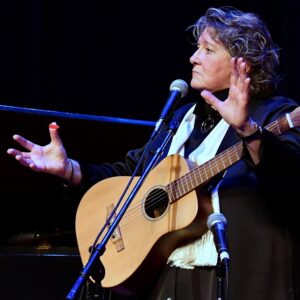Few places in the world have as high a residents-and-visitors-to-musical-performers ratio as does the Outer Cape between Memorial Day and Labor Day. But how best to plan your schedule with so much going on during that too-short interval? We asked members of the Independent staff and contributors to share songs by the artists they’re most excited about seeing this summer to help you decide. Listen to the tracks they picked here.
‘Fall Into Place,’ Couch
Payomet Performing Arts Center, June 29

Couch, the band, is like your first sip of blueberry basil kombucha: sparkly, slightly fermented, and just mysterious enough to make you wonder if you’re healing or hallucinating. Their sound — a many-headed hydra of soul, funk, gospel, and Gen Z jazz-pop — feels like a Craigslist couch in the best way: broken in, weirdly soft, possibly haunted, but somehow perfect once you sink in and decide not to ask where it came from.
Formed by seven friends in 2019, the Boston-based band makes earnestness feel quietly radical. Their live shows are group therapy disguised as a funk concert, with sweat, brass, and unexpected eye contact. You might cry. You’ll definitely bop. Someone near you will whisper, “I love them” after the first song and mean it.
“Fall Into Place” is like a voicemail from your future self telling you it’s going to be OK — that your houseplants forgive you and your therapist secretly thinks you’re doing amazing. Fresh off a recent tour, Couch is tighter and shinier but still charmingly lo-fi. Like if Lake Street Dive moved into a group house in Somerville with a youth choir and a part-time astrologer. —Aden Choate
‘Emily Remembers,’ Suede
Payomet Performing Arts Center, July 1

I remember seeing Suede under the Payomet tent last summer. Sitting up on the benches, I felt a little distant from the stage. But then Suede took the microphone, inhaled, and started to sing. It seemed like she was singing just to me. Her voice, smooth as her namesake, poured into my ears like honey from a spoon. Suede effortlessly belted Broadway hits. She crooned jazzy numbers and — much to my surprise and delight — whipped out a trumpet, which she played beautifully. She sat at the piano to tickle the ivories. In between all of that, she told stories with all the charisma of your favorite stand-up comedian. Then she pulled out an acoustic guitar and her band backed off.
Suede began “Emily Remembers,” written in 1995 by her friend Shirley Eikhard, who died in 2022. It’s a simple, nostalgic, lullaby-like song about a woman with Alzheimer’s. As Suede strummed her guitar and sang sweetly, tears came to my eyes. The song is the epitome of bittersweetness. It ends with the line, “She forgets how much she loves me — I remember it for her.”
I couldn’t believe Suede’s range. If I’m remembering correctly, she sang “Let it Go” from Frozen at the start of the show. And now here she was making me cry. Hers is a voice for every song. —Eve Samaha
‘Lady Liberty,’ Galactic (with Irma Thomas)
Payomet Performing Arts Center, July 20

There’s a lot of fine acoustic folk talent performing on the Cape this summer, but when it’s blazing hot out, some of us want sounds that sizzle and make us sway and sweat. And that’s what we’ll be doing in July when the funky, brassy New Orleans ensemble Galactic lets loose at Payomet.
“Lady Liberty” is the first single from the band’s new album, Audience With the Queen, its 11th studio album in three decades. Over the years, Galactic has made music with many jazz and R&B greats, including Macy Gray, Mavis Staples, and Trombone Shorty. The new record, released in April, features vocals from NOLA’s long-reigning soul queen, Irma Thomas. Thomas is now in her 80s; happily, her powerful voice is undiminished by age.
Like most of Galactic’s music, “Lady Liberty” will have you bobbing and clapping. But this is also a protest song, evident from the angry opening screech of electric guitar and lyrics that Thomas howls as much as sings. As the Soul Queen sings, “It’s just the world we’re living in/ the world we raised our children in/ Lord, save us all/ Lady Liberty took the fall.” —Katy Abel
‘I Don’t Care,’ Cimafunk (with George Clinton, Nik West, and Trombone Shorty)
Payomet Performing Arts Center, Aug. 3

Cuba’s Erik Alejandro Iglesias Rodríguez, better known as Cimafunk, is the mastermind behind the song “I Don’t Care,” which is equal parts old and new. Taking his stage name from the cimarróns — Cuba’s term for runaway slaves — he creates an infectious blend of hip-hop, Afro-Caribbean music, and funk.
Cimafunk pays homage to funk legend George Clinton and Parliament-Funkadelic throughout the track. Squishy synthesizers seem to float straight out of Parliament’s “Night of the Thumpasorus Peoples”; the call-and-response pattern between the backing vocals and a hefty brass section recalls Funkadelic’s track “(Not Just) Knee Deep.” But Cimafunk also puts his own spin on things, pushing the tempo and adding a sultry rap verse.
Clinton himself, meanwhile, shouts a gleeful series of one-liners over a driving bassline by featured artist Nik West. Another featured artist, New Orleans-based Trombone Shorty, blasts a raucous solo as Clinton says his name. The result is chaotic, but the musicians never seem to be in competition with one another: the chaos is completely under Cimafunk’s control.
It’s that controlled chaos that makes the track stand out on an already infectiously danceable album. Cimafunk’s groove is addictive; his maximalism gives the listener no choice but to surrender to the dance. As Clinton reminds us: free your mind, and your ass will follow. —Parker Mumford
Ludwig van Beethoven, String Quartet No. 15 in A Minor, Op. 132, Catalyst Quartet
First Congregational Church of Wellfleet, Aug. 8

Beethoven’s quartets always seem to possess the musicians who play them, as if they’re vivid hallucinations or powerful enchantments. His 15th string quartet in A minor was written in 1825, only two years before he died. The quartet is one of his “late” ones — different from the more formal quartets of his early period and the explosive ones from his middle period. The late quartets are assured, confident, and religiously personal.
By 1825, Beethoven was completely deaf. He couldn’t hear what he composed — at least not through his ears. But he could hear it in his head: the strident sforzandos and humming, fluttering motion of the first and second movements, the impassioned articulation of the fifth.
The third movement, Molto adagio — Andante, is the longest at more than 15 minutes. Beethoven was recovering from a painful intestinal illness that had lasted the whole winter; he called this movement a “song of thanksgiving of a convalescent to the deity.” Its three molto adagio sections, serene and otherworldly, like the tenderest hymns, are interrupted by andante sections marked Neue Kraft fuhlend, “feeling renewed strength.” The last hymn-like section is titled Mit innigster Empfindung, “with the deepest inner feeling.”
I’m thankful that the Catalyst Quartet is coming to Wellfleet this summer as part of the Cape Cod Chamber Music Festival, and that they chose this music to play. —Dorothea Samaha
‘One of Us,’ Joan Osbourne
Payomet Performing Arts Center, Aug. 9

Joan Osborne emerged onto the pop culture stage with her 1995 song “One of Us,” the lead single from her album Relish. It became a ’90s radio mainstay at the height of the Lilith Fair era, when earnest female singer-songwriters shared the airwaves with the more aggressive sounds of alternative rock.
I always found the song kind of funny. It’s a pop song about God sung with a nonchalant affect. The refrain asks the listener to imagine the divine as a “slob like one of us,” or “a stranger on the bus trying to make his way home.” The song exists in some deep theological territory, but Osborne brings the ideas down to earth with humorous imagery and language. There’s the unforgettable image of God sitting alone “with nobody calling on the phone except for the Pope, maybe in Rome.” I’m not sure if I should laugh or go into a space of spiritual reflection. Maybe both.
The idea of God inhabiting human flesh is a distinctly Christian idea. But Osborne has also spoken about the song as a reflection of Buddhist notions of a divine presence in every human, and it was written by songwriter and producer Eric Bazilian, who is Jewish. Perhaps now, when so many people are being disregarded and dehumanized, it’s a good time to take another listen to a song about the sacredness of humans. I recommend the 2001 acoustic version, which showcases her deep-throated, bluesy voice. —Abraham Storer



